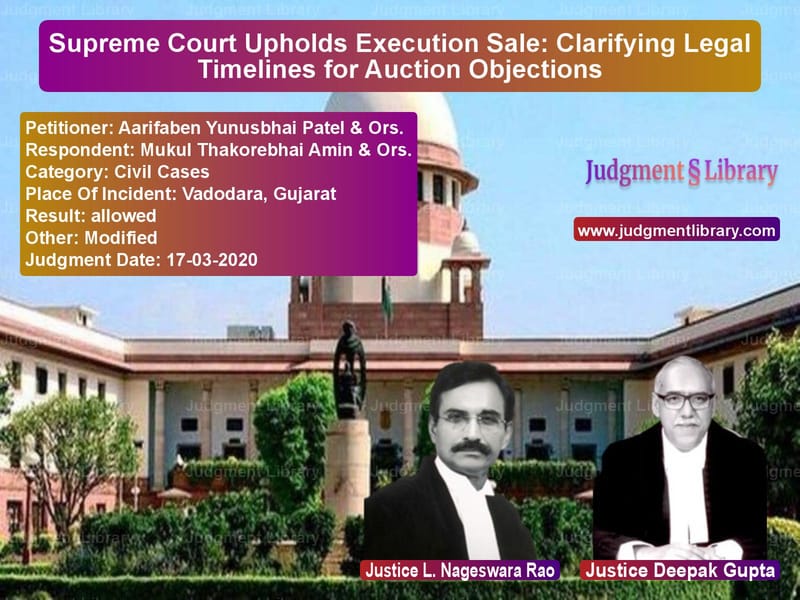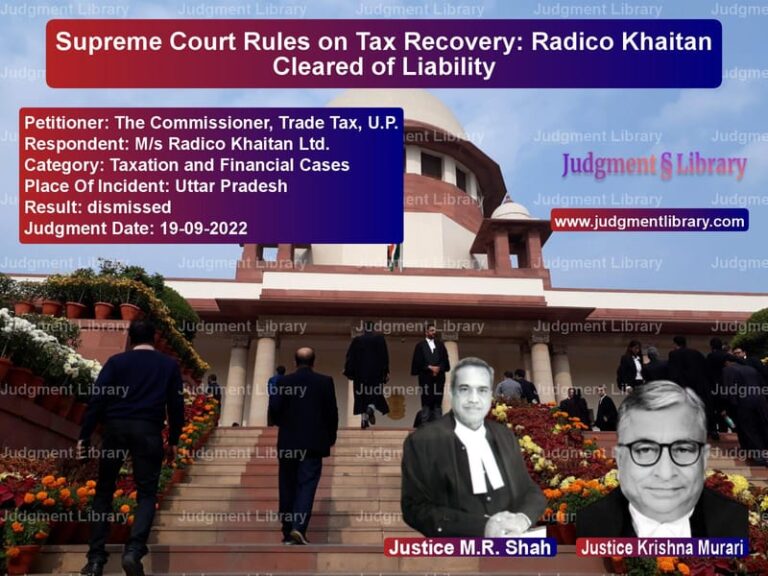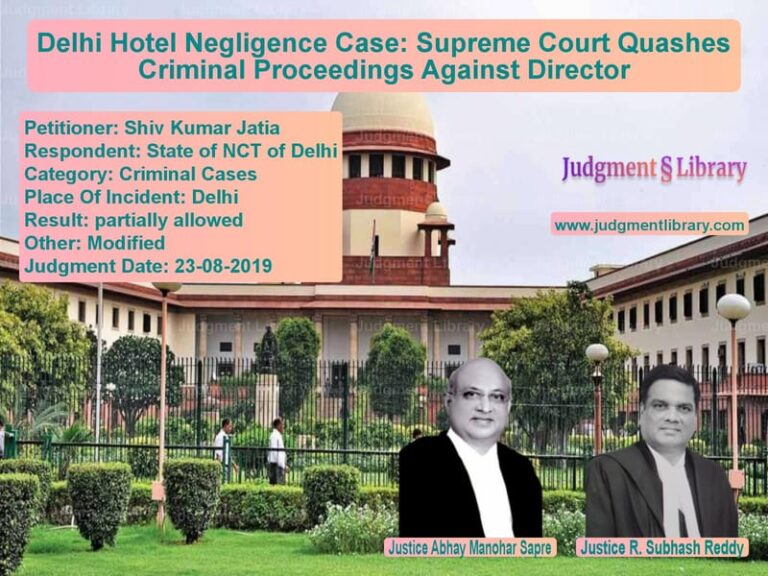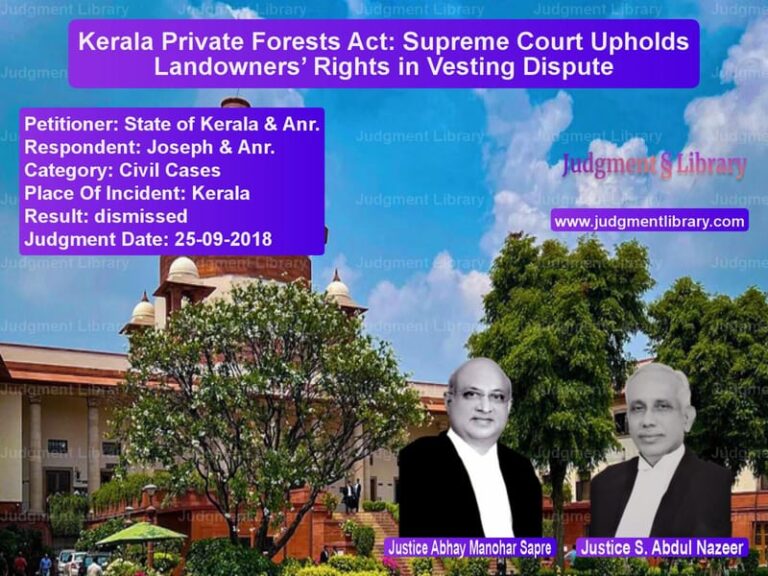Supreme Court Upholds Execution Sale: Clarifying Legal Timelines for Auction Objections
The Supreme Court of India, in Aarifaben Yunusbhai Patel & Ors. v. Mukul Thakorebhai Amin & Ors., rendered a landmark ruling clarifying the law regarding objections to execution sales. The case involved a challenge to an auction conducted under a court decree, with the primary contention being whether objections filed beyond the statutory limitation period could be entertained. The Court held that execution sales must be challenged within the prescribed limitation period and that mere procedural irregularities without substantial injury could not invalidate an auction.
Background of the Case
The case originated from a loan taken by M/s. Abhilasha Construction from Shree Mahalaxmi Mercantile Co-op Bank Ltd. (R-2). Due to non-repayment, the bank filed a summary suit for recovery of the loan amount. The defendants, including Mukul Thakorebhai Amin (R-1), failed to comply with multiple orders requiring partial deposits of the claim amount. As a result, the trial court passed a decree in favor of the bank on September 14, 2004, for an amount of Rs. 1,89,94,105.50.
When the judgment debtors failed to pay, execution proceedings were initiated before the Civil Judge, Vadodara. The court ordered the attachment and sale of 12 flats and 2 penthouses belonging to the judgment debtors. The auction was conducted in November 2007, and the appellants emerged as the highest bidders. However, the respondents challenged the sale, claiming procedural irregularities and inadequate notice.
Petitioner’s Arguments
The appellants (auction purchasers) put forth the following arguments in defense of the execution sale:
- “The execution sale was conducted in compliance with all legal requirements, and objections raised years later should not be entertained.”
- “The respondents had multiple opportunities to comply with court orders but failed to do so.”
- “The objections were filed beyond the prescribed limitation period under Order XXI Rule 90 CPC, making them legally untenable.”
- “Setting aside a legally conducted auction would undermine the certainty and finality of execution proceedings.”
Respondent’s Arguments
The judgment debtors, opposing the sale, raised the following objections:
- “The auction was conducted without adequate notice to the borrowers, violating principles of due process.”
- “The properties were sold at an undervalued price, leading to financial loss for the debtors.”
- “There was collusion between the decree-holder bank and the auction purchasers, which tainted the fairness of the sale.”
- “The High Court correctly intervened to rectify the injustice caused by an irregular auction process.”
Supreme Court’s Observations
The Supreme Court analyzed the validity of the objections and whether they had been filed within the legally permissible timeframe. The Court made the following key observations:
“Order XXI Rule 90 CPC mandates that objections to execution sales must be filed within 60 days of the sale. Once this period lapses, belated objections cannot be entertained.”
On the issue of procedural irregularities, the Court emphasized:
“A sale cannot be set aside solely on the ground of minor procedural lapses unless substantial injury to the judgment debtor is proven.”
Regarding the principle of finality in execution proceedings, the Court held:
“The sanctity of judicial sales must be upheld to prevent execution proceedings from becoming endless litigation.”
Legal Principles Established
This judgment reinforces several critical legal principles regarding execution sales:
- Limitation for Objections: Execution sales must be challenged within the time limit prescribed under Order XXI Rule 90 CPC, failing which objections are not maintainable.
- Substantial Injury Requirement: Even if procedural irregularities exist, an auction can only be set aside if the objecting party demonstrates that substantial injury has been caused.
- Finality of Execution Proceedings: The Court stressed that allowing belated objections would encourage endless litigation, defeating the purpose of execution sales.
- Protection of Auction Purchasers: Bona fide auction purchasers must be protected from unnecessary litigation that seeks to overturn legally conducted auctions.
Final Judgment
The Supreme Court allowed the appeal and reinstated the execution sale, ruling that the objections were time-barred and lacked merit. The High Court’s order setting aside the auction was overturned, and ownership of the auctioned properties was granted to the appellants.
Impact of the Judgment
This ruling has far-reaching consequences for execution proceedings and property auctions:
- Ensures that auction sales remain legally binding and are not overturned due to frivolous objections.
- Reaffirms the importance of adhering to statutory limitation periods in execution matters.
- Clarifies that minor procedural irregularities do not invalidate an auction unless they result in substantial injury.
- Strengthens legal protection for bona fide purchasers in judicial sales.
Conclusion
The Supreme Court’s decision provides much-needed clarity on execution sales and the permissible grounds for objections. By upholding the limitation period and emphasizing the principle of finality, the Court has reinforced the stability of judicial sales and protected the rights of auction purchasers. This judgment serves as a guiding precedent in ensuring that execution proceedings are conducted efficiently and fairly.
Petitioner Name: Aarifaben Yunusbhai Patel & Ors..Respondent Name: Mukul Thakorebhai Amin & Ors..Judgment By: Justice L. Nageswara Rao, Justice Deepak Gupta.Place Of Incident: Vadodara, Gujarat.Judgment Date: 17-03-2020.
Don’t miss out on the full details! Download the complete judgment in PDF format below and gain valuable insights instantly!
Download Judgment: Aarifaben Yunusbhai vs Mukul Thakorebhai Am Supreme Court of India Judgment Dated 17-03-2020.pdf
Direct Downlaod Judgment: Direct downlaod this Judgment
See all petitions in Property Disputes
See all petitions in Debt Recovery
See all petitions in Contract Disputes
See all petitions in Judgment by L. Nageswara Rao
See all petitions in Judgment by Deepak Gupta
See all petitions in allowed
See all petitions in Modified
See all petitions in supreme court of India judgments March 2020
See all petitions in 2020 judgments
See all posts in Civil Cases Category
See all allowed petitions in Civil Cases Category
See all Dismissed petitions in Civil Cases Category
See all partially allowed petitions in Civil Cases Category







